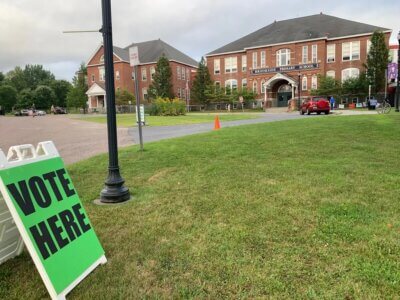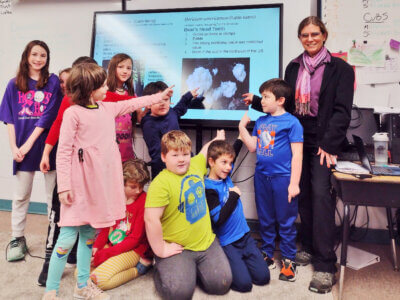Town Bites
Ricin danger at Wake Robin is under control
The resident at Wake Robin, who manufactured the toxic drug ricin and tested it on at least three neighboring residents to determine whether it had the desired poisonous effect before using it on herself, has been removed from the residence and is in custody awaiting trial. The state Health Department said last Friday that no one has become ill from the ricin.
According to the December 7 Burlington Free Press, federal prosecutors said that tests on those exposed returned positive results for “ricinine, as opposed to ricin.” Ricinine may indicate ricin exposure, but it may also indicate nontoxic exposure to other derivatives such as castor oil.
Charlotte News reporter John Hammer, a resident of Wake Robin, said the investigative bodies had been very thorough and had presented their findings to all members of the community. He felt comfortable that cleanup and security measures were more than sufficient. “In fact,” he said, “the detainee Betty Miller’s apartment may be the cleanest in the complex at this point.” He did, however, answer my phone call with the greeting, “Hello, this is John at Wake Ricin.”
A year’s investigation results in arrest of Charlotte Ferry Dock assaulters
A little over a year ago at 3:30 in the morning, two masked individuals robbed the ferry dock station in Charlotte, holding at gunpoint two security employees whom they also sprayed with pepper spray. After obtaining cash, the robbers fled, leaving the guards with minor injuries from the pepper spray. The two suspects, age 22 and 21, from South Burlington were arrested on Friday, Dec. 1, in their home there. Richard West, the 22- year-old, was released and scheduled to appear in court in January. The other suspect, Tiera Herron, is being held at the Chittenden County Regional Correctional Center on $7,500 bail.
Transition Charlotte is part of a national transition movement
Like many others, Charlotte residents are increasingly concerned about the challenges presented us by disruptions in our climate and by economic stresses. How can individuals and small communities make a difference? One answer is to become part of the Transition Movement, which offers hopeful solutions to regional, national and international issues by starting at the local level.
Transition is a movement of communities coming together to reimagine and rebuild our world. Since 2005 thousands of community groups around the world have come together to nurture a caring culture, one focused on supporting each other as groups or as wider communities. By weaving together many small “crowd-source” solutions they have boosted their impact on global problems. Transition initiatives are reclaiming their local economies, sparking entrepreneurship, reimagining work, reskilling themselves and weaving webs of connection and support.
Transition Town Charlotte began in the early 2000s as a local “sustainable living network.” We’ve collaborated with other organizations in Charlotte, such as the energy committee, the conservation commission, the library, the Grange, the Senior Center and the Congregational Church. We’ve held “reskilling” workshops where people have learned how to preserve foods, compost, use a scythe, care for goats and chickens and more. We’ve shared documentaries, held parties, collected electronic waste on Vermont Green-up Day, and created a food garden on town land to serve the Charlotte Food Shelf.
On Saturday Nov. 11, we held a “repair café,” at the town hall where townsfolk brought their broken, dull and ripped goods to be fixed, rather than sending them to the landfill. All shared coffee, baked goods and soup. There was no charge for repairs but a donation to the Charlotte Food Shelf was suggested. We made $190 and had lots of fun!
We’re now reaching out to our neighbors in Hinesburg asking how we can work together to create resilience in our communities. How can we better know one another and find where our common concerns lie? How can we learn from each other’s successes? One of the key ways that Transition spreads is through telling inspiring stories—and that’s what we will be doing starting Jan. 9 at 6:00 p.m. at the Hinesburgh Public House. At the first gathering we’ll watch a 25-minute video that explains more about the Transition Movement and inspires us all to think creatively. One phrase often heard in Transition circles is that we “unleash the collective genius in our communities.” You can learn more about the movement at Transition US and more about Transition Charlotte at their website.
Knowing that many people are doing good work in neighboring communities, this will be a chance to exchange ideas in a relaxed atmosphere and see where we may grow together.
Bill McKibben’s book gets a review in the New York Times
December 9 saw a lengthy review of Bill McKibben’s recently published book, Radio Free Vermont, in The New York Times Arts section. A novel, it does draw heavily from the secession movement promoted by our late Charlotte neighbor Thomas Naylor. The main character of McKibben’s novel is Vern Barclay, a septuagenarian radio host from St. Albans, who tries to get the secessionist movement going again in our state. The article’s author suggests that McKibben never proposes that secession is the best way to go, not a solution in “times of political turmoil.” Barclay uses the idea to get readers to “ponder the virtues of smallness in an age of military and corporate gigantism.”
The reviewer pooh-poohs Naylor’s secession proclivities, saying it was a “minor-league attempt” that “failed spectacularly.” Given the direction of our national government, however, secession may raise its antennae again. Rob Williams, co-author of the book, Most Likely to Secede, may yet feed his yaks on grain from a small nation, and Thomas may smile in his grave.
Related Stories
Popular Stories
If you enjoy The Charlotte News, please consider making a donation. Your gift will help us produce more stories like this. The majority of our budget comes from charitable contributions. Your gift helps sustain The Charlotte News, keeping it a free service for everyone in town. Thank you.
Andrew Zehner, Board Chair






